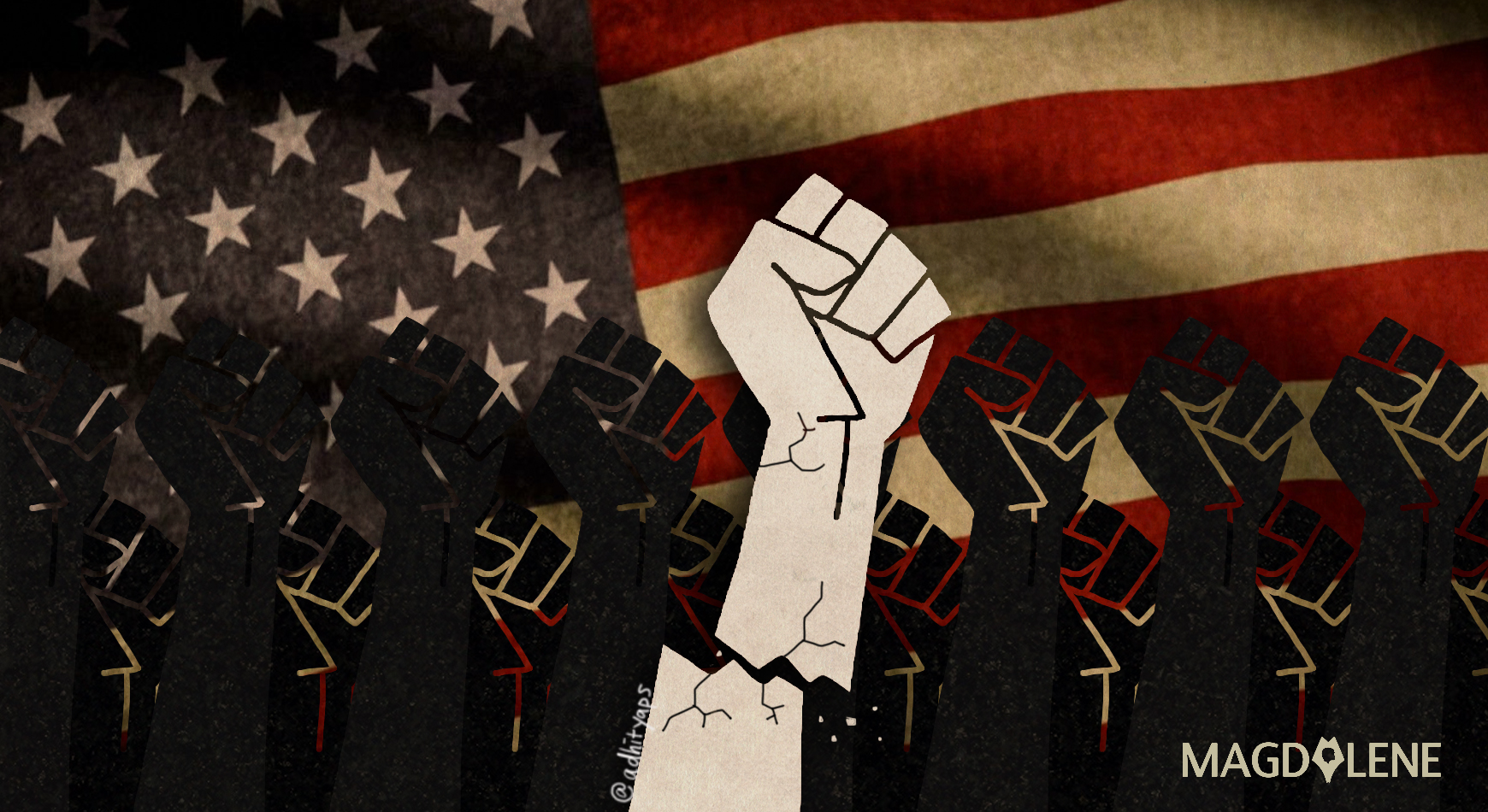Eight days after the historical presidential election of 2016, I asked myself, “Are you okay?” The day after the election, I was able to answer, “Yes, I am. We can overcome this. We have to give the new President a chance.” Four days after the election, I was able to answer, “Well, this is a transition period. People are having a post-election high. This will pass.”
Eight days after the election, after swastikas, “Trump Nation, Whites Only,” and “Kill Kill Kill Blacks” were emblazoned on the walls of elementary, middle, and high schools in the bluest of blue, Democratic counties minutes away from the nation’s capital, I find that my answer is silence. I cannot speak what my heart is welling up with – fear. An Indonesian-born Muslim woman, I feel overwhelmed with trepidation, anxiety and uncertainty, which hover and embrace me as if to frighten and comfort me at the same time.
I am not alone in feeling this way. Many Americans of immigrant descent do. Immigrant and non-immigrant communities all over the United states are rallying together to fight back against the growing hatred against them and an incoming Administration that emboldened such hatred with their cutting vitriol and vilifications throughout their campaign.
What should have been a momentous occasion when we celebrate the breaking of that highest of glass ceilings by a woman, Hillary Clinton, turned into a moment of silence for many parts of the nation. The next day, there were people who could not go to work. They could not bring themselves to face the new reality for they knew in their hearts of hearts that that reality will be a bleak one. We now face a leader who will turn his hate-filled campaign promises into actual government policy.
Ever since the results came pouring in one state at a time, President-elect Donald Trump has said he would deport three million immigrants; seek to appoint a white nationalist, alt-right movement leader, a perpetuator and proponent of Islamophobia and the co-author of the first ever Muslim registry (during the Bush Administration), to his transition team; and overturn a Supreme Court ruling that protects women’s rights.
How did this happen? We all campaigned so hard for Hillary Clinton. This year was the first year I actually got heavily involved in politics. I campaigned, I phone banked, I canvassed, just like all the dedicated volunteers and activists out there. There were activists who worked 16 hour days, seven days a week. They hopped on the bus to Pennsylvania or North Carolina in the wee hours of the morning then came back home in the wee hours of night only to do it again the next day. There were activists who spend their weekend days and weekday nights at the phone banks, hosting it at their home or going to the local campaign headquarters to call the undecided, the possible supporters and the potential voters. They, with their cheery voices, called the hundreds of numbers printed on the list with vigor and spirit unlike I have ever seen. Then you have the champions, the activists who are the leaders of the campaign and tasked with connecting communities, gathering said volunteers, and maintaining the energy even when the physical self is worn down.
To see these people in action, to know them and to see and hear their passions was such a privilege and honor. Now, these are the same people who are prepping themselves for another cause and champion to fight for. A champion and cause they possibly never imagined they would have to fight for at all: basic human rights in the United States of America against a potential fascist regime of a demagogue.
What of the Trump voters? How could they vote for a candidate like him? Do they support his hate-filled rhetoric and campaign promises? The answer is not easy nor is it black and white. All the research in the world may not fully glean how Donald Trump was able to move enough voters to sweep the Electoral College and win the White House.
What I understand is that many who support him are frustrated and upset. They lament the disappearance of the industries that provided their livelihood, of the time when social mobility was tangible, and of a moment when they can live in peace inside their communities.
Globalization, advancements in technology, and social media turned their worlds topsy-turvy. Rising costs of labor shifted the appeal of local workers towards international ones. The Industrial Revolution made way for the Knowledge Revolution, where data and information dominates and data towers dot the landscape instead of manufacturing factories billowing smoke into the skies. Newspapers that took a day to wait for us to read the headline news are now reached within a nanosecond, and we are bombarded and oversaturated with news, information, and updates from all over the world in our social media newsfeeds.
We must find a way to come together, so that developing the economy and bringing back jobs does not include further deterioration of civility and our humanity or a complete disregard of civil and human rights.
To the voters of Trump, please do not take my writing here as a repudiation of the concerns you have that moved you to vote for him. I understand. I understand you are frustrated, nay, hate the establishment, and have had your industries taken from you. I understand that you feel ignored by a government so passionate about refugees and immigrants (for their stories dominate the media), but are nonchalant about the plight of the struggling working class. I understand you have concerns about government infringing on your rights as a faithful person or infringing on your rights as a citizen who can bear arms. I understand you feel that as a businessman, he may turn America around to be a successful business. I understand. Many of us understand.
What I am grappling with is how can we look beyond the obscene and hate-filled rhetoric, the new President spewed forth like water during the campaign that is being utilized by his supporters to attack fellow Americans, fellow humans of this earth? At what cost must we – to use comedian Dave Chapelle’s words – “the historically disenfranchised,” pay for him to actualize and implement his platform? Is the great America he plans on building one that embraces or detests “the historically disenfranchised”? Is this great America an inclusive or divided one? Do we the "historically disenfranchised," also have a say in this great America? Or does the great America only belong to certain people? And what assurances do we, "the historically disenfranchised," have that we would not be the recipients of verbal and physical assault by those who feel they can be as bigoted and racist as they want because their President made racist and vile remarks throughout his campaign?
You want us to understand you, so we ask you give us the same courtesy. Understand that our fears and concerns are real and deserve to be considered as well. Understand that there is a growing sinking feeling we have that gets stronger by the day. What would you do if your elected president and his administration implement registration for all Muslims and an ID card that states their faith – not unlike the identity cards given to the Jews in the 1940s? What would you do if people followed the directive on that elementary school wall and kill, kill, killed “the historically disenfranchised”? What would you do if arrest warrants are sent out for journalists or activists who fight against such human right infringements and acts of tyranny? This is behind our growing sinking feeling and why I can no longer readily answer the question, “Are you okay?”
I am in disturbed wonderment that in the year of 2016 we are preparing to fight against internment camps, against identity cards, against erection of walls. People said that this year’s election would be an historical one, an election where we would ask ourselves, “Where were you when …?” We had looked forward to complete that question with, “… the first woman President, Hillary Clinton, was elected?” Now we are left with, “…when Donald Trump became President?”
So far, eight days afterwards, it has been rocky, but does it have to continue to be this way? I say, “No.” We all have to come together somehow, someway. Unite under one flag as Americans, as citizens of the world, and stand up against all kinds of hate and fear-mongering. We must find a way to come together, so that developing the economy and bringing back jobs does not include further deterioration of civility and our humanity or a complete disregard of civil and human rights. We must and we can because we are the United States of America. We may feel like we are sinking but we can always swim back up.
Nadia Syahmalina is an Indonesian American living in Maryland who actively campaigned in the US election this year. Read Magdalene’s piece on her and her fellow activist here.








Comments